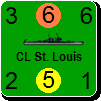Uxbridge
Posts: 1505
Joined: 2/8/2004
From: Uppsala, Sweden
Status: offline

|
I followed this thread some week ago, but never had time to post. Finding myself with nothing in particular to do for a short while, I thought I just through in my two cents.
Although the views of what would have happened if Moscow was taken seems to stretch from nothing at all to possible surrender, what we can agree upon is that the fall of the Soviet capital would at least have a negative effect on the Russians (i.e. no one suggested that the Russians would actually gain from it).
Personally, I don’t very much like when there’s a definite effect for an event such as the one discussed. This is so much more true as this time there’s no exact precedent in history. That the fall of France leads to Vichy France is easy to accept because it happened. When it comes to Moscow, we have nothing to compare with and it is, in my world, therefore better if the effect is also one that neither player will know of, or can calculate with, beforehand.
If I were to design such an effect, I would have done something on the following lines: To begin with there has to be an absolute condition for the effect to trigger. I think I would opt for all hexes of Moscow taken and held for at least 4 turns. That way the Germans have to hold it in force for a while and the Soviet player gets a chance to recapture the capital.
Once the above condition has been met, and Moscow have in fact fallen, I would have the system create a random value between 30 and 70 (for example) to establish whether the loss of Moscow hits the Soviets mildly of more harshly. Once this value was established, it would be used for determining the final outcome of the effect. Just for the argument, let’s say that this random number was ”53”, placing it roughly in the middle between ”mild” and ”harsh”.
Moving on, there will now be a number of checks, each to establish whether any one of a number of concequences occur. Below is a suggestive list of possible concequences, all of them cumulative. The system now rolls a d100 for each of these concequences. If the roll is above 53, the system will pass the check and nothing happens. If it is below 52, the check fails and the concequence is triggered.
The Soviet ADM-level takes a -200 point hit (can turn into negative value).
The Soviet ADM-allocation is lowered by 25 % the next 12 turns.
The Soviet ADM-allocation is lowered by 10 % the next 50 turns.
The Soviet partisan recruitment rate is lowered by 15 % for the duration of the game.
The Soviet partisan recruitment rate is lowered by 60 % for the next year.
The Soviet rail capacity is reduced by 20 % for duration of game.
All Soviet ground units suffers an immediate 30 % increase in FAT.
In the turmoil of this Soviet catastrophy, a number of high-ranking Soviet leaders is permanently removed from the game.
The Western Allies stop all Lend Lease deliveries for 30 turns.
The Germans receive a one-time manpower boost from occupied Baltic and Russian cities.
The German rail capacity is raised by 5 %.
If we now assume that the first check passed, the second failed, the third passed and so on, the net effect of the fall of Moscow would thus be: ADM-allocation lowered by 25 % for 12 turns, partisan recruitment down 15 %, rail capacity down 20 %, some officers kicked and the Germans get a manpower boost. I’m sure that you can come up with many more plausible concequences to check.
The nice thing with a system like this, would be that neither the German nor the Russian player will have any knowledge what the actual outcome will be. They will both be looking at the Soviet capital with different eyes than they are with the present solution, however, and the game will be rather more interesting and exciting. At least I think it would.
< Message edited by Uxbridge -- 4/14/2011 9:33:54 PM >
_____________________________
|
 Printable Version
Printable Version













 All those rail lines you see are not worth a crap. Most are single line with dirt or sand as ballast. Throw too much traffic on it and you end up with a pile of tinder and twisted metal where you once had a train. I love it.
All those rail lines you see are not worth a crap. Most are single line with dirt or sand as ballast. Throw too much traffic on it and you end up with a pile of tinder and twisted metal where you once had a train. I love it. 



 New Messages
New Messages No New Messages
No New Messages Hot Topic w/ New Messages
Hot Topic w/ New Messages Hot Topic w/o New Messages
Hot Topic w/o New Messages Locked w/ New Messages
Locked w/ New Messages Locked w/o New Messages
Locked w/o New Messages Post New Thread
Post New Thread